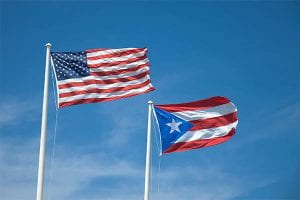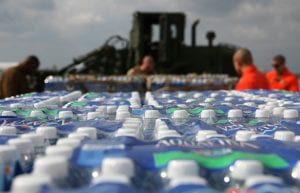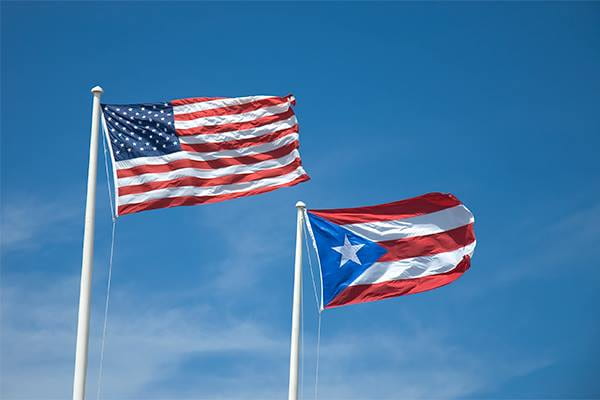Over the month of September, the island of Puerto Rico experienced two traumatic hurricanes: Hurricane Irma and Hurricane Maria. The eye of Hurricane Irma, a category five hurricane, hit north of the Island on September 7, 2017. Irma, the most powerful Atlantic hurricane to hit the island, left 1 million people without power. Shortly after Irma, Puerto Rico (PR) was ravaged again by another devastating hurricane. Hurricane Maria made direct landfall on Puerto Rico, resulting in a complete power outage in the island. 60,000 people were without electricity by the time Maria hit the island. Governor of Puerto Rico, Ricardo Rosselló explained to CNN the island’s power grid is “a little bit old, mishandled and weak,” thus grid could take months to repair. Stemming from Puerto Rico’s power catastrophe, which especially strained the island’s power authority, Puerto Rico Electric Power Authority (PREPA) filed for bankruptcy last July after racking up a $9 billion dollar debt. Not only did PREPA file for bankruptcy, so did Puerto Rico in May 2017. Puerto Rico’s bankruptcy is the biggest municipal bankruptcy ever filed in United States history, owing the US more than $70 billion, thereby complicating officials ability to borrow money for public use. Post natural disaster recovery is reliant on money and resources, and without adequate funding and focused government management, rebuilding the island’s power system will be strained at best. The Puerto Rican economy and infrastructure was already struggling, and the impact of Hurricane Maria will exacerbate the issue further.

Even though Puerto Rico is not an American state or located on the mainland, PR is an American territory. Legally, a US territory has “the status of commonwealth, a legal and political status that is above a territory but still below a state.” In 1917, President Woodrow Wilson signed the Jones-Shafroth Act, which granted U.S. Citizenship to Puerto Ricans born in Puerto Rico on or after April 25, 1898. Puerto Rican US citizens are entitled to the same inalienable rights as mainland US citizens. Puerto Rican US citizens are also entitled to equal FEMA federal government response to natural disasters. Puerto Rico is home to 3.4 million US citizens and, without power, millions of Americans will not have access to clean water, medical supplies, food, and basic public health services.
Food and Water
Currently, food and water supplies are at emergency levels throughout Puerto Rico. According to FEMA, 42% of the people on the island do not have access to potable water. Potable water is safe to drink and use for food preparation, without risk of health problems. The loss of power resulted in a lack of access to clean water to bathe, cook, or flush toilets since water cannot be pumped into resident’s homes. Limited clean water sources result in a substantial public health crisis. Without clean water, individuals are prone to malnutrition, and poor hygiene and sanitation; this amplifies the spread of communicable diseases across the entire island. Specifically, the CDC highlights proper water, hygiene and sanitation has the “potential to prevent at least 9.1% of the global disease burden and 6.3% of all deaths globally.”
As for food, 85% of the island’s food is imported from neighboring countries, like the Dominican Republic. Extreme infrastructural damage by Hurricane Maria massively disrupted the territory’s typical food imports. Maria additionally decimated Puerto Rico’s agriculture sectorresulting in a depletion of 80% of the crop value and local food production in Puerto Rico. The destruction of food imports and local food production is predicted to dramatically increase the cost of food itself and dramatically increase food shortages. These consequences will likely result in increased malnutrition of PR citizens, thereby increasing related illnesses and their effects, such as stunting and wasting throughout the island. Recently, President Trump temporarily waive the Jones Act which “requires goods shipped between American ports to be carried out exclusively by ships built primarily in the United States, and to have U.S. citizens as its owners and crews.” Governer Richardo Rosello of Puerto Rico requested the act be waived, as the Act hinder disaster relief efforts post Hurricane Maria. Lack of power and crumbled infrastructure continue to make the distribution of food and humanitarian aid a challenge and pressing human rights issue.

Health Care
“Just about every interaction with the health system now involves electricity, from calling a hospital for help to accessing electronic medical records and powering lifesaving equipment like hemodialysis machines or ventilators”
– Jullia Belluz, Vox
Puerto Rico’s health care infrastructure is devastated. Without an operational electrical grid, hospitals utilize gas-powered electric generators for energy. However, continuous diesel fuel shortages and lack water have ruthlessly weakened the capacity to treat patients throughout dozens of hospitals on the island. Likewise, numerus citizens injured during the hurricane have yet to be treated by health care professionals. Vulnerable populations, including: 1) children, 2) the elderly, and 3) persons with disabilities 4) life threatening health conditions, are at more severe risk for injury and death. Vulnerable populations such as the elderly and newborns require greater medical attention than the general population. Lack of power and hospital infrastructure becomes life threatening to patients needing live saving medical treatment.
Right to Adequate Health
The entire loss of power throughout the island exacerbates the intensity of Puerto Rico’s state of emergency. In our technologically advanced society, power is used in almost every aspect of our lives, especially in the US bureaucracy. Power helps us achieve our right to adequate health, explicitly defined in the Universal Declaration of Human Rights (UDHR). It is necessary Puerto Rico finds a timely solution to the territory’s failed power grid. The longer the communities live without power, the prospect of healthy and safe living environments remains grim. A complication furthering the aforementioned crises is the US’s congressional response to Hurricane Maria, which has been exceedingly disproportionate as compared to FEMA’s response to Hurricanes Harvey and Irma. Two weeks after Hurricane Harvey hit Texas, the president signed a $15 billion Harvey relief fund to help victims. However, for victims of Hurricane Irma, more than 20 days have passed since the initial hit on Puerto Rico. Two weeks later Hurricane Maria hit the island, and still Congress has failed to propose a spending budget for post-disaster relief. US officials claim they are waiting for greater insight into the full assessment of damage on Puerto Rico.
Hurricane Maria completely infringed on the rights of US citizens. The effects of Maria are going to negatively interfere with a population’s economic, social, and cultural rights explained in the UDHR. Food, water, and health care are all required to maintain adequate health. Delayed financial response by congress to Hurricane Maria will continue to perpetuate poverty throughout the region. Future PR recovery initiatives need to focus on rebuilding the island’s economy, and power grid infrastructure. Puerto Ricans are American citizens and are entitled to the same protection as all citizens; however, all people’s human rights should be protected regardless of citizenship.

